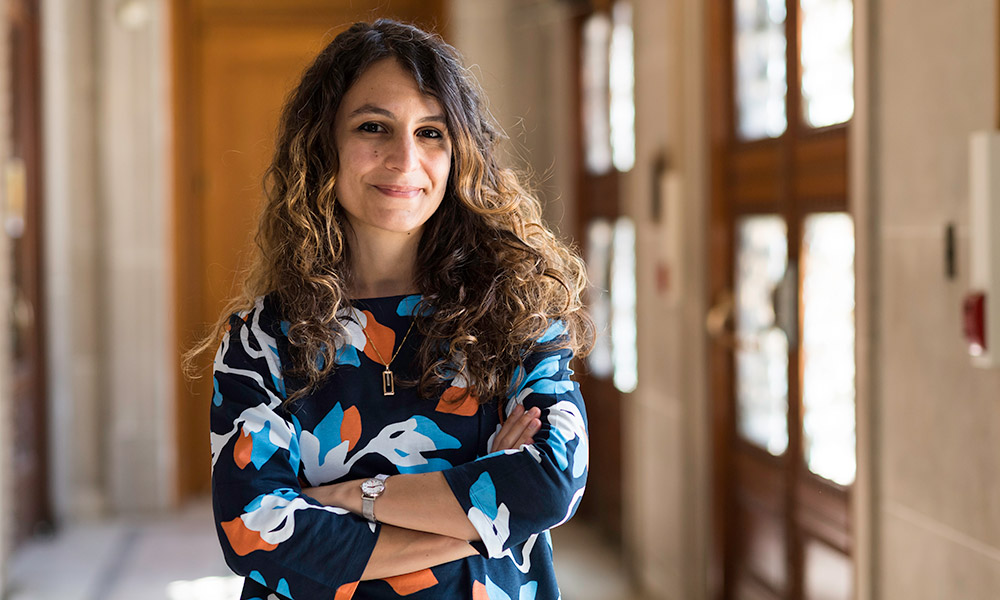Philosopher Zeynep Soysal believes in building bridges, both between fields of inquiry and between philosophy and the wider world.
“I think there are basic clarifications that philosophers make, and they can be helpful in solving problems. They can have a big effect on how people view thinking and rationality,” she says.
Soysal, who joined Rochester’s faculty this year as an assistant professor of philosophy, works at the place where mathematics and the philosophy of language converge: she investigates how meaning is constructed in mathematical language. A specialist in both the philosophy of mathematics and the philosophy of language, she uses tools from each to help illuminate questions in the other.
“Mathematics has always been a very important test case for philosophical views, right from the beginning of philosophy,” she says. Mathematical knowledge is distinctive and complex, and philosophers aren’t in agreement about how it functions. Empiricists—David Hume and John Locke are two of the most famous—hold that people derive knowledge from sense experience. But math is a problem for empiricists, because mathematical and logical truths aren’t the product of experience. By contrast, rationalist thinkers—such as René Descartes and Gottfried Wilhelm Leibniz—contend that sense experience isn’t at the root of all understanding, and that mathematics provides a model of thinking with which sensory experience must be reconciled.
Mathematics isn’t just about numbers, in other words. It’s a hotbed of philosophical questions.
A double major in mathematics and philosophy at Cornell, Soysal went on to earn her PhD in philosophy at Harvard in 2017. She works in the tradition of the logical empiricists. Such thinkers argue that mathematical knowledge operates as linguistic knowledge does: the truth of mathematical statements is a result of the way mathematical terms are defined.
Randall Curren, the chair of the philosophy department, says that philosophy is unique for the way it addresses the nature of knowledge, meaning, and being in a wide range of disciplines—and for the tools of analysis it offers for answering questions of broad public interest. “Making the most of its potential requires sustained engagement across the disciplinary divides, and this is a hallmark of Zeynep’s research and teaching,” he says.
Soysal says she’s discovered an environment at Rochester that encourages such interdisciplinarity. She was surprised to be invited, in her first semester on campus, to give a lecture to the math department. She has already forged ties with linguists on campus, too. “There’s an openness to philosophy in the University that’s very rare,” she says.
Philosophical thinking can help in almost any endeavor, she says. She’s been teaching “Reason and Argument” this spring, a course intended to teach students how to engage in rational argument. Introduced by Richard Feldman, a professor of philosophy and currently the University’s interim president, the course is “concerned with how you teach people the habits of mind, and also the expectations of others, that help you get at the truth,” says Soysal.
“Thinking clearly and systematically, in the way we’re trained for in philosophy, is incredibly powerful. But taking a philosophy class or a formal logic class might not enable students to make those connections in real life.” And so, she looks for ways to help people discover the connections—when she’s teaching, as a certified mediator, and as a member of the governing board of Boston-based educational nonprofit ThinkerAnalytix. In partnership with Harvard’s philosophy department and pre-college classroom teachers, the group is working to help teach school-age students about argument analysis and reasoning.
Immediately before joining the Rochester faculty, Zeynep was a fellow in Harvard’s philosophy department and a postdoctoral associate at Boston University. There, she was part of a project titled “Philosophy of Emerging Computational Technologies: Humans, Values, and Society in Transition.” Researchers in philosophy and communications at Boston University led the group, and a Mellon Foundation Sawyer Seminar grant supported its work.
The experience gave Soysal the chance to take a philosophical look at journalism. She began by thinking about the very different ways that mathematicians and journalists approach expertise and meaning.
“Mathematics is very special, in the sense that there is an accepted set of axioms that everybody works from. You write the axioms down and everybody basically agrees with them. It’s a unique feature of the mathematical community. There are people who contribute to determining meanings, and there are people who have to defer to the experts in the mathematical community.”
But authority isn’t granted so neatly in the rowdy world of journalism, especially in the digital age. What, Soysal wondered, is journalistic expertise—and what does that reveal about the basic social function of journalism?
She calls journalism a “philosophically rich topic,” though it is one to which philosophers have paid scant attention. She’s helping to change that, with her chapter, “Truth in Journalism,” in the forthcoming Journalism and Truth in an Age of Social Media. Edited by James E. Katz and Kate Mays, the book will be published by Oxford University Press.
“In journalism, you need to present truths in a way that will be accessible to people and usable for them,” Soysal says. “But journalists’ responsibilities can pull them in different directions, and as a result, truth can be compromised. There’s so much distrust of the news these days, but when truth is compromised, it’s not necessarily happening because journalists are bad at their jobs. For instance, simplification or using narratives can help a journalist convey information more clearly. It might skew the truth a little, but I argue that it’s inevitable.”
Soysal argues that transparency—letting news readers and listeners know what the journalists’ evidence is for a particular story, how strong it is, and why they’re presenting the information as they are—is crucial. “Basic clarification like this can help people become better consumers of news, and better producers of it, too,” she says.
For journalism, as for so many things, philosophy can offer useful insight, Soysal holds.
“Philosophical thinking can help you do whatever you want to do.”




